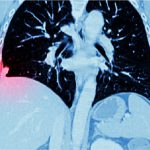The lungs are part of the respiratory system. The cells in the lungs do tend to change and can grow or stop behaving normally. Some of these cells can grow into noncancerous benign tumors, and some can grow into cancer. These cells can destroy the nearby tissue and can also spread to other parts of the body — lung cancer comprises of different types and grades.
What are the different types of lung cancer?
The type of lung cancer that a person has can help doctors understand the cell that cancer started in. Lung cancer is of two common types, small cell lung cancer, and non-small cell lung cancer. Lung cancer can also be of the primary and secondary type depending on the origin of cancer. Primary lung cancer is the one that starts in the lungs, and secondary lung cancer is the kind of cancer that starts in another part of the body and spreads to the lungs.
Small cell lung cancer
This type of cancer has been characterized by small cells that multiply very quickly and form large tumors that spread throughout the body. This kind of cancer is common among smokers. Also called oat-cell cancer; it constitutes about 10-15% of all lung cancer.
Non-small cell lung cancer
Non-small cell lung cancer constitutes about 80% of the lung cancer cases, and it further comprises four different types depending on the cell of origin.
Adenocarcinoma
Adenocarcinoma forms the mucus-producing glands and is the most common in women and non-smokers.
Bronchi alveolar carcinoma
This type of cancer forms near the air sacs of the lungs
Squamous cell carcinoma
Squamous cell carcinoma forms in the lining of the bronchial tubes, commonly seen in smokers.
Large cell carcinoma
Large cell carcinomas form near the outer edges or surface of the lungs. This type of cancer is rare.
Other types of lung cancer
Pancoast tumors
Pancoast tumors are the kind that affects the top part of the lungs.
Mesothelioma
Mesothelioma is the kind of cancer that affects the covering (the pleura) of the lungs.




